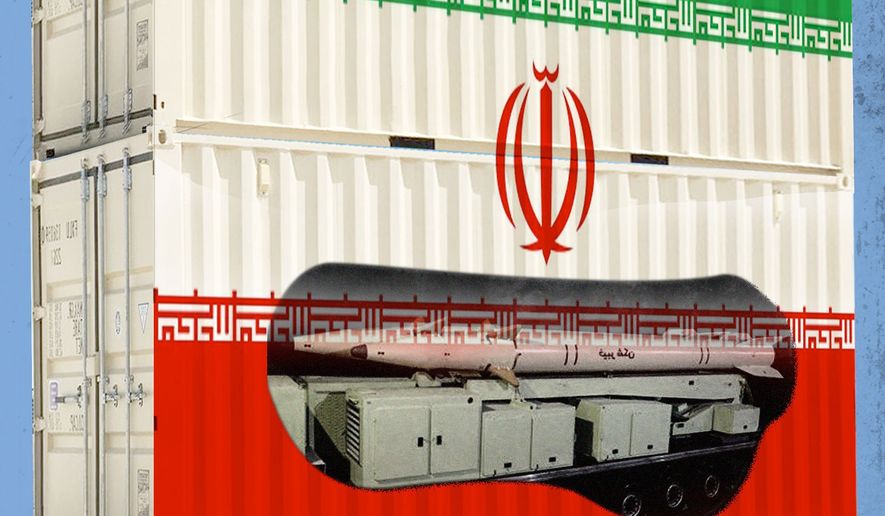OPINION:
More than 3,000 assault rifles, 578,000 rounds of ammunition and 23 anti-tank guided missiles. A shipment from Americans to Ukrainians defending themselves from Russian invaders? No, a shipment from the Islamic Republic of Iran to Houthi rebels attempting to take over Yemen.
The good news is that these weapons didn’t arrive as scheduled. In coordination with the U.S. military, French special forces seized them on Jan. 15 in the Gulf of Oman. It’s encouraging to see Western allies working together against common enemies.
But this was no isolated incident. On Jan. 6, U.S. forces intercepted a vessel carrying 2,100 assault rifles from Iran bound for Yemen. And in December, the Navy seized a boat loaded with 1,400 AK-47 rifles, 226,000 rounds of ammunition, and rocket propellants.
How many such shipments have made it into the hands of the Houthi movement is anyone’s guess. But the insurgents have sufficient firepower to hold much of western Yemen, including Sanaa, the capital.
The Islamic Republic has become the Arsenal of Tyranny. Thanks to its assistance, Lebanon-based Hezbollah outguns the Lebanese armed forces. The regime provides weapons to its troops and proxies in Syria and Iraq, to Hamas and Islamic Jihad in Gaza and, increasingly, in the northern West Bank, of which the Palestinian Authority has been losing control. Israel does its best to destroy such weapons caches either en route or upon arrival.
Most recently, Tehran has been sending drones to Russia to be used by Vladimir Putin to slaughter Ukrainians. A weapons factory in Isfahan, Iran, was recently damaged or destroyed. Israel has neither confirmed nor denied responsibility. Over the weekend, it was revealed that Moscow and Tehran are building a drone factory in Russia.
That should be the last nail in the coffin of the Iran deal that former President Barack Obama concluded and from which former President Donald Trump withdrew.
President Biden has attempted to revive it in a weaker form. In exchange for the promise of Iran’s rulers to delay — not terminate — their development of nuclear weapons, they’d receive hundreds of billions of dollars they could use to better arm their cronies abroad, make more sophisticated missiles, and continue killing, torturing and imprisoning dissidents at home.
Returning to Yemen: Its civil war has been ongoing since 2014. It has produced what the U.N. calls the world’s worst humanitarian crisis. The insurgency was launched by the Houthi movement, officially Ansar Allah (Partisans of God). The group draws followers from the Zaydi Shias, who constitute about a quarter of Yemen’s 30 million people. Most other tribes are Sunni.
Backing Ansar Allah is one way Iran’s rulers spread their revolution. Through Hezbollah, they have become the most powerful force in Lebanon. Hand in hand with Russia, they have propped up the mass-murdering Assad dictatorship in Syria. And they are slowly — though perhaps not surely — turning Iraq into a colony.
Yemen sits on the eastern shore of one of the world’s most strategic waterways: the Bab-el-Mandeb, which connects the Red Sea to the Gulf of Aden and, by extension, the Mediterranean to the Indian Ocean.
It would be a game-changer if Tehran took control of that passage as well as the Strait of Hormuz, which separates Iran from the Arabian Peninsula and through which 30% of the world’s seaborne crude oil trade passes daily.
A cease-fire between the Houthis and the Yemeni government was negotiated last April but lapsed in October. Tehran will do what it can to prevent a diplomatic settlement so long as victory remains within reach.
The Yemeni government is supported by the Saudis, an American strategic partner since President Franklin Roosevelt met with King Abdul Aziz Ibn Saud on Valentine’s Day 1945. The tacit understanding since: The U.S. will provide security and the Saudis will keep the oil flowing at reasonable levels and prices to fuel international economic growth.
As president, Mr. Obama violated that arrangement when he tilted toward Tehran and told the Saudis to “share the neighborhood.”
The 2018 assassination of Jamal Khashoggi, a Saudi dissident and contributor to The Washington Post, further soured relations.
As a presidential candidate, Mr. Biden vowed to make the Saudis “pay the price, and make them in fact the pariah that they are.”
Soon after moving into the White House, he removed the Houthis from a terrorist blacklist (a conciliatory gesture that was undeserved and unreciprocated) and “directed an end to the United States support for the Saudi-led Coalition’s offensive military operations against the Houthis in Yemen.”
Iran’s rulers were undoubtedly delighted. The Saudis were obviously dismayed. Why would a U.S. president help Tehran’s clients? The Houthis launch missiles and drones at Saudi and Emirati targets. Why doesn’t Mr. Biden want to make them pariahs? Does he not understand what it would mean if the Houthis rule Yemen on the Saudis’ southern doorstep while Tehran solidifies its Shia crescent north of the Arabian Peninsula?
Some analysts argue that the U.S. should seek detente with the Houthis. Some of these same analysts had advised — and indeed still do — that within the Taliban are moderates with whom we can get along.
The Houthi movement’s slogan is “God is great, death to the U.S., death to Israel, curse the Jews, and victory for Islam.” Call me crazy, but I can’t see free and decent nations finding much common ground with such people.
If I’m right, America should do all it can to prevent Tehran’s weapons from reaching its proxies — with help from the French, the Israelis and other allies. It’s not in the U.S. national interest for Yemen to become another colony of the Islamic Republic’s expanding and bellicose empire.
• Clifford D. May is founder and president of the Foundation for Defense of Democracies (FDD) and a columnist for The Washington Times.




Please read our comment policy before commenting.